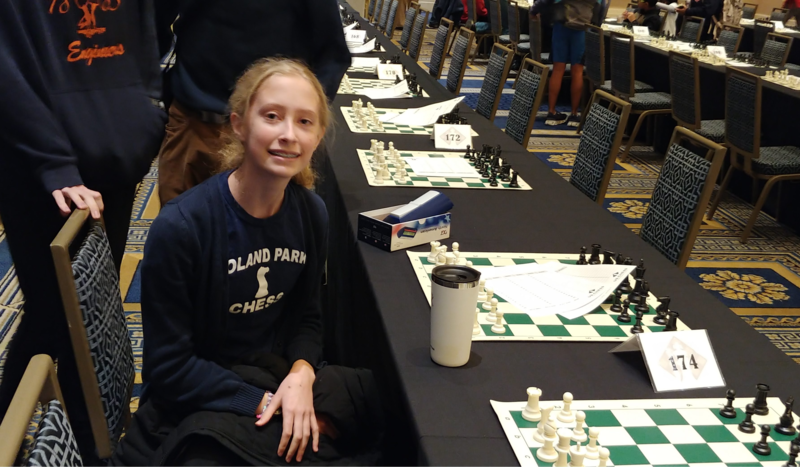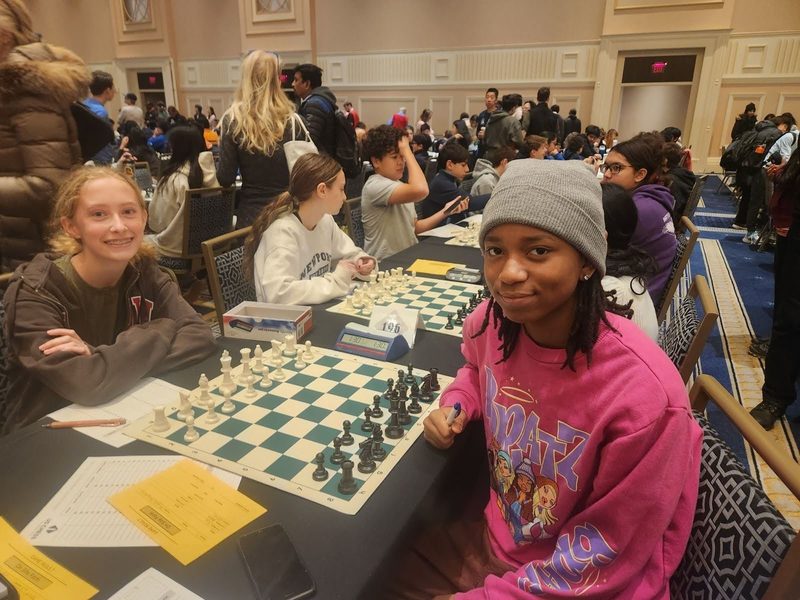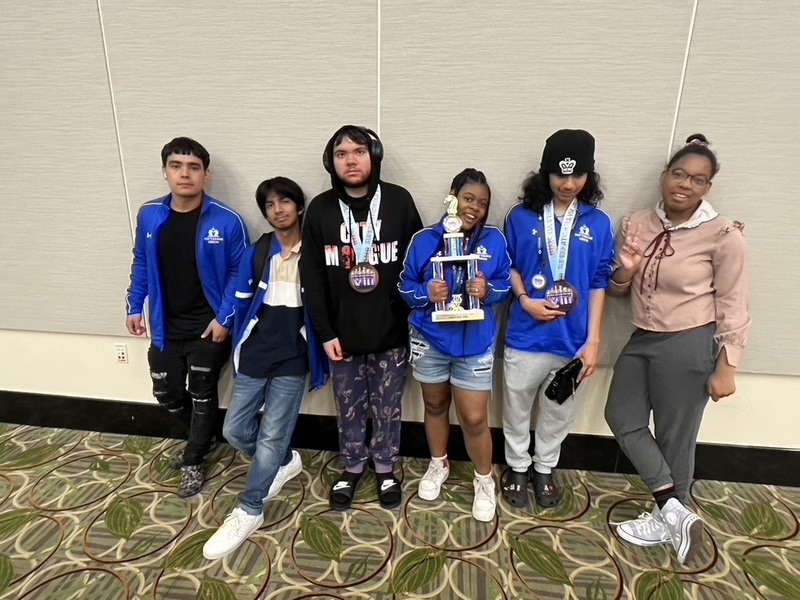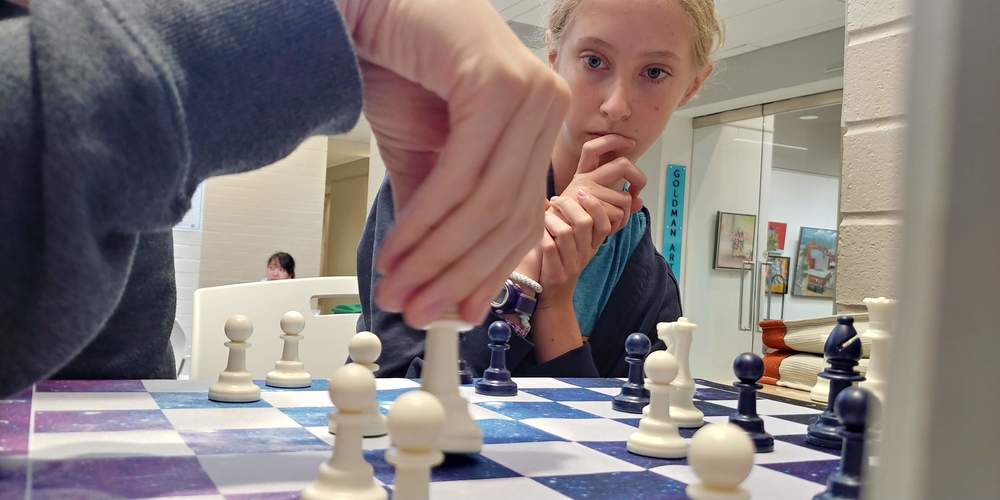 Winning in chess requires patience, discipline, developing a long-term strategy, and maintaining focus. Those are also important qualities in becoming an accomplished chess player—and joining the ranks of Kaniya Gardner, Lillian Goldberg, and Rose Brown. The three City school students are ranked in the top 25 female chess players (youth and adults) in Maryland by the US Chess Federation, and they’re active participants in their schools’ chess programs.
Winning in chess requires patience, discipline, developing a long-term strategy, and maintaining focus. Those are also important qualities in becoming an accomplished chess player—and joining the ranks of Kaniya Gardner, Lillian Goldberg, and Rose Brown. The three City school students are ranked in the top 25 female chess players (youth and adults) in Maryland by the US Chess Federation, and they’re active participants in their schools’ chess programs.
Rose, a recently graduated 8th grader at Roland Park Elementary/Middle School who will attend Baltimore Polytechnic Institute in the fall, is ranked 16th in the state. Kaniya, a rising senior at Patterson High School, is ranked 20th, and Hampstead Hill Academy 7th grader Lillian is ranked 22nd.
To achieve the US Chess Federation honor, students play in UCSF-sanctioned tournaments. Players receive a numerical rating that reflects their skill level, and these ratings change based on the results of each game against other rated players.
Having opportunities to learn and play chess helps develop confident, flexible, and innovative thinkers, as outlined in City Schools' Portrait of a Graduate. Dozens of schools have Chess Clubs, and coaches from organizations like the Baltimore Kids Chess League, Board Room Chess, and Silver Knights Chess Academy lead after-school activities at schools for hundreds of students. And students are excelling - individuals and teams from across the district are winning regional and national competitions.
 Kaniya became interested in chess from watching her father and grandfather enjoy the game. She started playing when she was seven years old and began competitive matches in ninth grade.
Kaniya became interested in chess from watching her father and grandfather enjoy the game. She started playing when she was seven years old and began competitive matches in ninth grade.
She enjoys the process: “In chess, you can think as long as you want and no one is leading you. I can measure my own progress. I like talking to my opponents and understanding their thought process. It makes me a better player. And it’s boosted my confidence.”
Kaniya participates in the Afterschool Chess Club and the Chess Advisory during the school day at Patterson. “Chess gives me discipline,” says Kaniya, a straight-A student. “You need a plan to reach your goal. I have a lot of goals—finish school, take a nursing class and become a certified nursing assistant, and go to college to study psychology.”
Social studies teacher Chris Baron is one of Kaniya's four coaches and describes the impact that chess has. “Kaniya works hard and puts in the effort. Being smart isn’t enough; you have to review and study past games. It’s hard to admit and concentrate on your own mistakes. Kaniya has done that to improve. She’s always focused on asking, ‘What can I learn to make me a better player?’”
Mr. Baron also teaches a chess class for English language learners at Patterson. “It’s a fun way to learn the language," he says. “Chess has its own language and vocabulary, and the fun, less formal setting lets students interact with each other and takes the pressure off of learning a new language.”
Lillian Goldberg joined the Hampstead Hill Chess Club last year. It’s one of two weekly Chess Clubs at the school; one for novice players and one for those who are more advanced. According to Hampstead Hill Assistant Principal Mike Lucas, the Club was formerly led by parents and continues to benefit from volunteer coaches as more students take an interest in learning and playing. “The key is that we have a couple of great coaches.”
Lillian enjoys the game because “chess helps me think about things. It’s interesting that there are so many variations—just one move can change a game. It’s always interesting to me how people move.”
She also points to the benefits of chess beyond the game. “Chess helps me do better in school. I take time to think and not rush. I can see things in advance.”
For Rose Brown, “Chess allows me to think in different ways. I am a bit competitive, and chess allows me to channel that in a healthy way.”
Says Rose’s chess coach at Roland Park, Mark Wingfield, “Rose attends nearly every rated tournament and was one of our most consistent representatives on the team. She attended every practice and spent each practice both sharpening her own game while also coaching some of our younger players.”
“Chess helps me in math,” Rose adds. “When there’s a really complex problem where you need to do multiple steps and then use those steps to find the answer, I am able to put everything together because of chess.”
Congratulations to Kaniya, Lillian, and Rose - we can’t wait to see your next moves!

